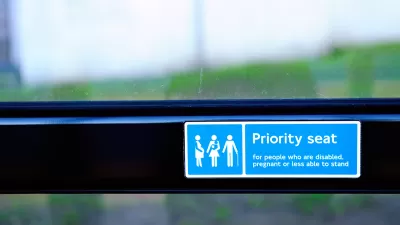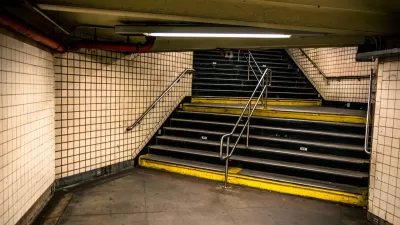The New Urban Agenda, which sets a new global strategy for sustainable urbanization, still has shortcomings regarding universal access for people with special needs.

Citiscope is profiling the 16 constituent groups comprising the General Assembly of Partners (GAP), which is "the main vehicle for civil society to organize and advocate ahead of Habitat III, the U. N. urbanization summit in October in Quito."
The most recent article in the series is written by Gregg Scruggs, who focuses on the push for universal accessibility in urban areas. To understand the challenges of universal accessibility, Scruggs speaks with Victor Pineda, who runs the Disability Inclusive and Accessible Urban Development Network, is a professor of urban planning at the University of California, Berkeley, and chairs the GAP constituent group for disabled persons.
"According to Pineda, roughly 1 billion people have some kind of disability. But not all disabilities are created equal, and the wide range of possible hindrances means there are few one-size-fits-all solutions," writes Scruggs.
Achieving the goals of the constituent group has also proved a challenge. According to Scruggs, the final draft of the New Urban Agenda, as released in September, included the words "persons with disabilities" 12 times. "However, the document does not mention 'universal design' or 'reasonable accommodations', two linchpin concepts in legislation to protect the disabled, nor the convention itself," explains Scruggs.
Scruggs also speaks with Mohammed Loutfy, the executive director of the Arab Forum for the Rights of People with Disabilities and a co-chair of the GAP group. Loufty describes his experiences with poor accessibility as well as the next political and public relations steps for the accessibility agenda to achieve a greater share of the New Urban Agenda.
FULL STORY: ‘I love cities, but they don’t all love me back,’ disabled advocate says ahead of Habitat III

Maui's Vacation Rental Debate Turns Ugly
Verbal attacks, misinformation campaigns and fistfights plague a high-stakes debate to convert thousands of vacation rentals into long-term housing.

Planetizen Federal Action Tracker
A weekly monitor of how Trump’s orders and actions are impacting planners and planning in America.

In Urban Planning, AI Prompting Could be the New Design Thinking
Creativity has long been key to great urban design. What if we see AI as our new creative partner?

Pedestrian Deaths Drop, Remain Twice as High as in 2009
Fatalities declined by 4 percent in 2024, but the U.S. is still nowhere close to ‘Vision Zero.’

King County Supportive Housing Program Offers Hope for Unhoused Residents
The county is taking a ‘Housing First’ approach that prioritizes getting people into housing, then offering wraparound supportive services.

Researchers Use AI to Get Clearer Picture of US Housing
Analysts are using artificial intelligence to supercharge their research by allowing them to comb through data faster. Though these AI tools can be error prone, they save time and housing researchers are optimistic about the future.
Urban Design for Planners 1: Software Tools
This six-course series explores essential urban design concepts using open source software and equips planners with the tools they need to participate fully in the urban design process.
Planning for Universal Design
Learn the tools for implementing Universal Design in planning regulations.
planning NEXT
Appalachian Highlands Housing Partners
Mpact (founded as Rail~Volution)
City of Camden Redevelopment Agency
City of Astoria
City of Portland
City of Laramie





























